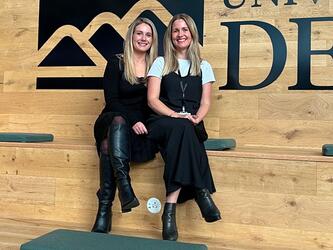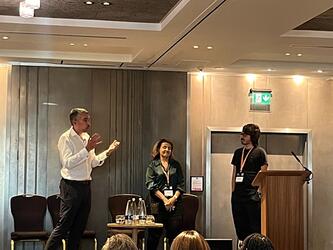MRS Behavioural Science Summit 2023: Climate change and Covid-19

Schools pose new challenges
In the summer of 2020, during Covid-19, BVA Nudge Consulting was asked by Napsian to work on a programme in northern Italy to help primary school children adhere to Covid-19 social distancing and hygiene guidance.
Ted Utoft, chief executive at BVA Nudge Consulting, said there were substantial challenges around the intention to action gap, given the age of primary school children. “A four-year-old in nursery school doesn’t have any intention around hygiene, or any intention around good behaviour, for the most part,” he explained. “We had to keep that in mind when it came to the teachers who were putting these nudges and directions in place. For children, there is no intention. That’s why schools are the perfect place for applying nudge theory, as we had to change behaviours when there is a lack of awareness, understanding and motivation.”
The result was 15 separate nudges to help children keep to the Covid-19 guidance safely. Solutions included stamping hands every morning with washable ink that only dissolved if the children washed or sanitised their hands enough during the day. Another saw children design their own place mats to help them know where to sit in the cafeteria, and therefore stick to social distancing.
Alessandra Russo, head of insight hygiene – Italy and Greece at Reckitt said that 70% of teachers and 77% of parents in the study saw improvements in their children’s hygiene behaviours.
Is behavioural science doing enough on sustainability?
In a panel session, Jonathan Hall, managing partner at Kantar’s Sustainable Transformation Practice, said that generally people “think business and brands are not doing enough” on climate change and sustainability, with 79% holding businesses responsible for environment issues, 38% thinking brands are making climate change worse and 74% thinking businesses have a role in making society fair.
“What’s clear is that whatever impact we are trying to have, we are not cutting through,” Hall said. “Businesses need to start feeling more comfortable with being transparent about the transition journey they are on. People need a level of trust to change their behaviours, and they will only get that trust if they see a business is being open and transparent with them and is not greenwashing.”
This is where behavioural science could help, he said, with value-action gaps being 84% globally on climate change, and 88% wanting help from businesses to live sustainable lifestyles, according to Kantar research. But businesses need to design suitable products, Hall added.
“There are still too many examples of marketers thinking people will sacrifice particular benefits they are looking for based on category drivers – performance, quality, taste or style,” he added. “There is no way people will sacrifice those things unless they are particularly committed, which most people aren’t. We need to think about how we deliver additional benefits or better or different product or service experience.”
Practical steps on sustainability
There are solutions rooted in behavioural science that could help address sustainability and ingrain climate-friendly behaviours, if barriers could be tackled, the panel heard. “There are very real, tangible barriers when people come up against when they are trying to make sustainable product and services choices,” Hall explained. “Knowledge, awareness, confused labelling, where you find products and high prices. For me, what it is about is us as professionals being empathetic to that situation and starting to unlock those frictions and barriers.”
Charlotte Thompson, director, commercial reach and influence at the Cambridge Institute for Sustainable Leadership, said demand-side mitigation was key to the climate crisis, putting needs and behaviours at the centre. “There is a huge opportunity for the behavioural science community to inform more of the ‘how’,” she explained. “We know the ‘what’, but there is an opportunity to help inform how we get there and influence the level of change needed very quickly.”
This could mean changing our ‘brain print’ – how brands get certain ideas normalised across society, such as only eating cereal at breakfast or proposing marriage using an engagement ring. “We can tap into brands’ brain print and rewire brain print in terms of sustainability,” Thompson told the panel. “Brand leaders have an opportunity with every strategic decision they make to reinforce either sustainable or unsustainable behaviours and norms.”
The third panel member, Alex Peters, global purpose insights lead at Reckitt, said that businesses needed to drive scale and to engage people. “The consumer or the person using the product we produce needs to feel it is a win for them, the business needs to feel there’s a win and there needs to be a win for the planet,” he added. “There are lots of opportunities to create those ‘win, win, win’ scenarios.”
No generation gaps
Values influence behaviour, but the mechanics of this relationship and how it can be used within a behavioural science framework is still poorly understood. To better understand this relationship, BCW helped carry out a world-wide study of personal values featuring 37,000 respondents surveyed across 30 different markets.
Taylor Saia, strategy director at BCW Global, said one of the biggest findings were that most generations had similar beliefs and priorities to one another. “You might expect one generation to differ vastly from another generation,” he said. “You might expect, for example, Gen Z would be vastly different to the Silent Generation.
“What we found was that, across the board, generations are pretty much the same. Looking at an average person, we are more united in our values than we are different to one another. The top three values that spike across all generations is benevolence, security and universalism. What that means is that in general, people are caring, social security-seekers.”
The impact of branding
Owain Service, chief executive at CogCo, discussed a project carried out with Citizens Advice on ‘buy now, pay later’ credit products and how in-app and website design could influence people’s propensity to use them when buying items online. The study included building a prototype of a retail app, which was then used by 2,000 participants to complete a shopping task, with CogCo testing which version of the app would result in the most people choosing to pay with buy now, pay later and whether different versions would result in higher levels of understanding of these choices.
The results found that many of the interventions had no statistically significant effect, with the only statistically significant impact being switching off the branding and marketing next to the buy now, pay later options. “There are legitimate situations where you might want to use buy now, pay later,” said Service. “But I think having some awareness of the effect of some of the design components is pretty essential.”

We hope you enjoyed this article.
Research Live is published by MRS.
The Market Research Society (MRS) exists to promote and protect the research sector, showcasing how research delivers impact for businesses and government.
Members of MRS enjoy many benefits including tailoured policy guidance, discounts on training and conferences, and access to member-only content.
For example, there's an archive of winning case studies from over a decade of MRS Awards.
Find out more about the benefits of joining MRS here.














0 Comments